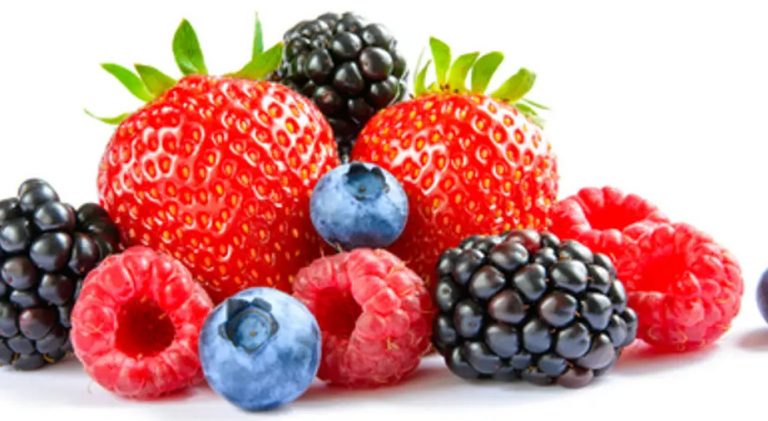Depending on their nutrient content, berries offer a variety of benefits:
Contains antioxidants: Berries contain antioxidants that reduce free radicals, which are unstable molecules that damage body cells and cause oxidative stress. Compounds such as these protect body cells from damage. Blueberries, red raspberries, and red raspberries are among the fruits with the most antioxidants after pomegranates, according to a 2008 laboratory study published in the Journal of Agricultural and Food Chemistry.

A good source of dietary fiber is berries, especially water-soluble fiber, which slows the movement of food through the digestive tract, making you feel fuller for longer, which helps you lose weight. Slow helps control weight by reducing calorie consumption during the day. Berries are low in carbohydrates due to the fiber they contain, which is not considered a pure carbohydrate.
The berries are rich in vitamins and minerals, including phosphorus, calcium, iron, potassium, magnesium, manganese, sodium and copper, as well as antioxidant vitamins such as vitamin A and vitamin C, which help reduce inflammation. On one hand, berries contain simple sugars like glucose and fructose and a small amount of fat. On the other hand, they contain vitamin E, which helps reduce inflammation.
Berry properties and benefits studied
According to a 2012 study published in the British Journal of Nutrition, berries were shown to help control blood sugar levels, since the study involved a group of people who ate berries and sugar. According to the study, eating berries with sugar resulted in a lower increase in blood sugar and insulin levels than consuming sugar alone.
In 2014, a laboratory study published in the Journal of Biochemical Nutrition found that berries contain high concentrations of anthocyanins, which are antioxidants with anti-inflammatory properties.
By increasing beneficial bacteria such as bifidobacteria and lactobacilli and reducing tissue number, whole mulberry extract boosts immune and gastrointestinal function.
There was a 2014 study published in the American Journal of Clinical Nutrition that found that berries may reduce the risk of type 2 diabetes. The study included 2,332 men, one of whom had diabetes or a blood sugar condition. Fasting does not suffer. The rate of diabetes and its relationship with eating a variety of fruits and vegetables, and as a result, this study showed that men who eat berries are less likely to develop type 2.
A comprehensive analysis published in the journal Scientific Reports in 2016 found that consuming berries reduces the risk of cardiovascular disease, as 22 studies conducted on 1,251 people showed that eating berries reduced lipoprotein levels. Low density lipoprotein (LDL) is associated with high blood pressure.
There is little evidence linking berry consumption to a reduced risk of cancer, according to a laboratory study published in 2007 in the Journal of Molecular Nutrition and Food Research.
Berries may reduce chromosomal DNA damage because they contain polyphenols and anthocyanins.
Although human studies have shown this effect, they have been weak and insufficient to confirm it, and another study from 2006 found that extracts of certain berries, specifically black raspberries and strawberries, reduced the growth of cancer cells in the colon, according to a study published in the Journal of Agricultural and Food Chemistry.

Children’s benefits of berries
As mentioned earlier, berries contain many beneficial nutrients, including fiber, vitamin C, and antioxidants like polyphenols, which may be beneficial for children if they are included in their diets. It is important to eat fresh berries in pieces to avoid choking, and to avoid pesticides, you should buy organic varieties, and allergies to berries are uncommon, but it is best to consult with your doctor. Make sure that the child is not allergic to berries if he suffers from chronic eczema or food allergies.
Weight loss benefits of berries
As mentioned earlier, berries are considered a low-calorie food, since half a cup of 74 grams of blueberries contains only 42 calories, but supplies 12% of the body’s daily vitamin C and magnesium needs, along with 18% of the body’s protein needs. The daily requirement of vitamin K and a cup of strawberries, high in fiber, increase feelings of satiety, which may reduce the consumption of more calories and make weight control easier, in addition to fiber’s role in reducing calorie absorption from nutritious meals. Berries can be added to breakfast cereals, yogurt, baked goods, and salads when they are fresh or frozen.
The benefits of berries for diabetics
Fruits like berries can be beneficial to diabetic patients because they are low in calories, sweet in taste, and rich in nutrients that reduce the disease, such as antioxidants and vitamins.
Pregnant women can benefit from berries
Because they are a good source of vitamin C, useful carbohydrates, antioxidants, and fiber, berries are one of the foods that pregnant women can eat, and they also contain a lot of water, which helps to keep pregnant women moist. You will benefit from vitamin C in berries by absorbing iron and strengthening your immune system.
Berries’ nutritional value
Listed below are the nutrients in 100 grams of fresh berries:
| Nutritional element | Nutritional Value |
| now | 90.95 ml |
| calories | 32 calories |
| Protein | 0.67 grams |
| Fats | 0.3 grams |
| carbohydrates | 7.68 grams |
| fiber | 2 grams |
| sugars | 4.89 grams |
| Calcium | 16 mg |
| iron | 0.41 mg |
| magnesium | 13 mg |
| phosphorus | 24 mg |
| potassium | 153 mg |
| sodium | 1 gram |
| Zinc | 0.14 mg |
| copper | 0.048 mg |
| Selenium | 0.4 micrograms |
| Vitamin C | 58.8 mg |
| thiamine | 0.024 mg |
| Riboflavin | 0.022 mg |
| niacin | 0.386 mg |
| Vitamin B6 | 0.047 mg |
| folate | 24 micrograms |
| Vitamin E | 0.29 mg |
| Vitamin K | 2.2 micrograms |
There are many types of blueberries that are safe to consume, but some types may contain toxic substances and, if consumed in large quantities, may cause unpleasant side effects.
Berries are contraindicated
Certain berries, such as blueberries, raspberries, and strawberries, should be avoided by people with salicylate allergies.


